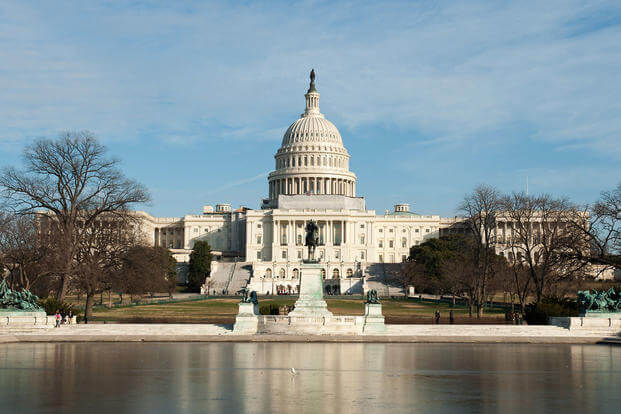 Military Update: Rep. Phil Roe (R-Tenn.), chairman of the House Veterans Affairs Committee, expected on Tuesday that every committee member, Democrat and Republican, would vote for the VA Care in the Community Act (HR 4242), his comprehensive plan developed over months to reform the flawed Veterans Choice program.
Military Update: Rep. Phil Roe (R-Tenn.), chairman of the House Veterans Affairs Committee, expected on Tuesday that every committee member, Democrat and Republican, would vote for the VA Care in the Community Act (HR 4242), his comprehensive plan developed over months to reform the flawed Veterans Choice program.
Roe therefore said he was surprised and disappointed when all nine Democrats at the bill’s mark-up hearing opposed the legislation they helped to shape and for which they were original co-sponsors.
In a phone interview, Roe blamed the split vote on “pure, blatant, raw politics based on this tax bill.”
The tax bill in dispute is the Tax Cuts and Jobs Act backed solely by Republicans. Democrats and many independent analysts contend it overwhelmingly favors corporations and the wealthy over middle-class taxpayers. The Congressional Budget Office forecasts it will drive up the nation’s debt by $1.5 trillion in a decade.
Democrats told Roe they could not in principle vote for his Choice reform bill, given uncertain funding support ahead if many more veterans need outside care, and on the same day House Republicans alone approved a mammoth tax relief bill.
During markup of Roe’s bill, various amendments were accepted or rejected. But Democrats and Republicans also traded insults and challenged motives in a committee room where compliments over bipartisanship typically are exchanged.
“I am troubled that we are going to put Choice funding at risk, again, on the very day that some people on this committee will be voting to drive up deficits and to give a tax break to the wealthiest Americans,” said Rep. Ann Kuster (D-N.H.).
Rep. Tim Walz (D-Minn.), ranking Democrat on the panel, said the Republican tax relief bill attacks Obamacare funding and Medicaid eligibility, so that more veterans from these populations might have to rely on VA for health care, increasing budget strain on VA-paid community care as reforms take hold.
What particularly upset Democrats, in the shadow of a massive tax relief bill, was an amendment Roe planned to offer at markup that would cap growth of authorized funding for VA-paid community health care at three percent annually for four straight years, starting in fiscal 2019.
Roe drafted his cap language after CBO’s cost estimate for his Choice reform bill came in at roughly $39 billion over five years, more than double what Roe expected. It alarmed Republicans negotiating the easing of spending caps on other federal departments, including for defense, to avoid a government shutdown.
Roe said he decided moments before mark-up to withdraw his amendment, at the urging of veteran service organizations who opposed it. He didn’t reveal his decision, however, until late in the hearing, after members had traded harsh words.
The Choice reform bill cleared committee on a straight 14-9 party-line vote. Many of its reforms are also proposed in the Caring for Our Veterans Act (S. 2193), approved by the Senate Veterans’ Affairs Committee three weeks earlier.
Veterans service organizations prefer the Senate bill, in part because it embraces another key goal, to expand eligibility for Post-9/11 caregiver benefits to older generations of veterans and caregivers. Some veteran groups are also nervous that Roe’s bill would allow veterans referred to community-based primary care providers to stay with them for a year or even longer. Guardians of the VA health care system worry this would be a step toward privatizing veterans’ care.
Roe, an obstetrician who ran a private practice for 31 years, said his intent is not to privatize veterans’ health care but, through competition, force improvement in care quality and management of staff and resources across VA’s 168 hospitals.
“I’ve said from the beginning [that] I most likely would have written more choice into the bill” if possible, he said, given how competition improved outcomes in his own practice. “If I’d been taking care of your wife for 20 years and, all of a sudden, I quit doing a good job, she could vote with her feet. The poor veteran is stuck there. And one of the ways the VA gets better is to compete for patients.”
The House and Senate are expected to debate and vote on their Choice reform bills in early 2018. Differences then will be resolved a House-Senate conference led by Roe and Sen. Johnny Isakson (R-Ga.), chairman of the Senate committee. In our interview, Roe said he probably will not support including Senate caregiver expansion language in a final Choice reform bill.
His own committee hasn’t held a hearing on how the current caregiver plan operate to help severely injured veterans of the Post-9/11 era, Roe said. It “would be irresponsible of me as the chairman to just okay something that’s going to cost tens of billions of dollars.…I’m going to be pretty hardnosed about that.”
But he added, “We’re going to need some hearings [to] look at the current program, see what are the good parts, what are the parts not working. And I’m committed to do that. That one of the things we want to do next year.”
Roe said his Choice reform bill would create a permanent consolidated VA Care in the Community program, replacing “arbitrary administrative rules” that use driving distance and wait times to determine eligibility for private sector care. Instead, providers and patients will decide on referrals based on clinical needs.
VA’s current “fee-for-service approach” to community care would be replaced with a managed care model. Every VA enrolled veteran would be assigned to a primary care provider. VA care overall would gain from modern health care management techniques, telemedicine and cutting-edge practices and technologies.
“We’re going to look at best practices, how you get better outcomes with lower money. I can tell you that our practice [in Tennessee] took 25,000 Medicare patients and, in the first year, saved $6 million in Medicare money because their care was managed. Part of the Choice plan I put together is a managed care plan, and for older, sicker patients it’s the most savings you get. I was astonished that you could do that but you absolutely can. And get better outcomes.”
Roe didn’t disagree with Walz that during future negotiations over VA budgets, Roe’s proposal of a three-percent cap on annual growth in VA community care spending might be adopted. But Roe said he is confident that sustaining the current level of VA spending on community care is likely adequate, given the savings expected from program consolidation and from managed care reforms.
Roe dismissed as “bogus” Walz’s argument that proper funding of a reformed Choice program could be secured for veterans if Republicans would just add one half of one percent to favorable tax rates that still permitted wealthy hedge fund managers under the GOP tax relief bill President Trump will sign soon.
Democrats believe, Roe said, “if government spends money it will somehow help the economy.” Republicans and most small business owners believe “leaving people more of the money they earned…lets the economy grow and expand.”
Roe said his own experience in private practice after Reagan-era tax cuts support his view that tax relief spurs job creation and employee compensation.
Also, Roe suggested, sounding alarms over the funding of VA community-based care is unnecessary. During his own nine years in Congress, he said, “we have never not supplied the money that veterans have needed for health care.”
To comment, write Military Update, P.O. Box 231111, Centreville, VA, 20120 or email milupdate@aol.com or twitter: @Military_Update.
# # # # Tom Philpott has been breaking news for and about military people since 1977. After service in the Coast Guard, and 17 years as a reporter and senior editor with Army Times Publishing Company, Tom launched "Military Update," his syndicated weekly news column, in 1994. "Military Update" features timely news and analysis on issues affecting active duty members, reservists, retirees and their families. Visit Tom Philpott's Military Update Archive to view his past articles. Tom also edits a reader reaction column, "Military Forum." The online "home" for both features is Military.com.  Tom's freelance articles have appeared in numerous magazines including The New Yorker, Reader's Digest and Washingtonian. His critically-acclaimed book, Glory Denied, on the extraordinary ordeal and heroism of Col. Floyd "Jim" Thompson, the longest-held prisoner of war in American history, is available in hardcover and paperback. Buy Glory Denied from Amazon
Tom's freelance articles have appeared in numerous magazines including The New Yorker, Reader's Digest and Washingtonian. His critically-acclaimed book, Glory Denied, on the extraordinary ordeal and heroism of Col. Floyd "Jim" Thompson, the longest-held prisoner of war in American history, is available in hardcover and paperback. Buy Glory Denied from Amazon





